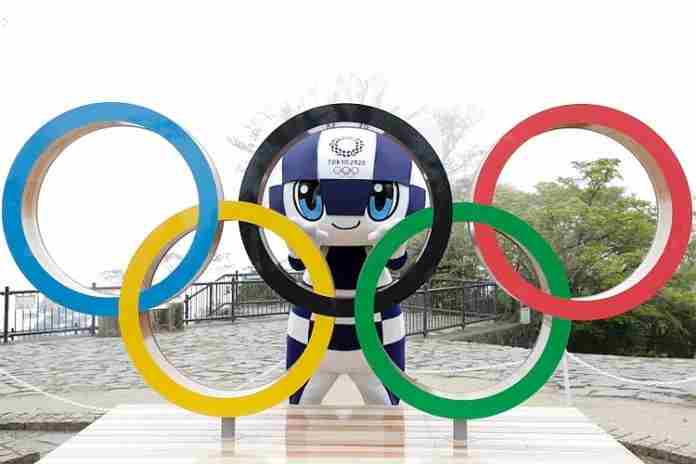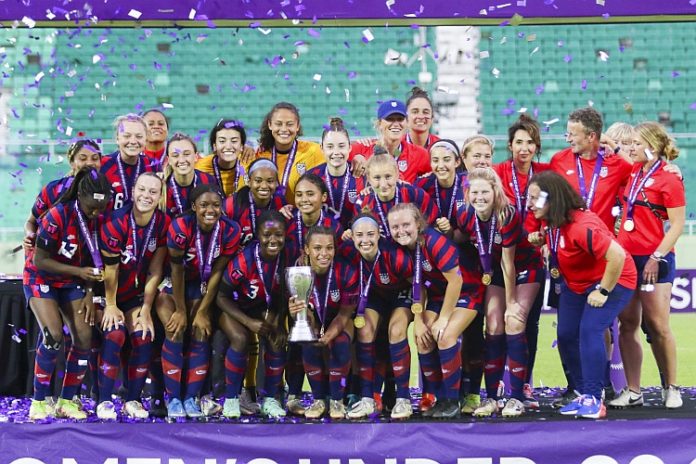(★ A spectacular individual donation has helped cover 75% of our site costs for services for the first half of 2022. Want to help? Please donate here. ★)
(For our Highlights of the weekend’s major competitions, click here.)
● Plus: Paralympics end in Beijing = IOC: $200,000 sent to help Ukraine = Aquatics: Swiss won’t swim at Worlds if Russians there = Football: FIFA to welcome Amnesty Int’l petition on Qatar = Gymnastics: Full house for Uchumura farewell = Judo: Russia and Belarus withdraw from IJF events = AT THE BUZZER: Effects of new shoe tech in distance races ●
With the close of the Winter Paralympics in Beijing, the Olympic Movement’s five-year “pivot to Asia” has concluded.
All three of the major Games in this period were troubled. The 2018 Olympic Winter Games in PyeongChang (KOR) were threatened by possible attacks from North Korea, the 2020 Tokyo Games was delayed a year by the Covid pandemic and the 2022 Olympic Winter Games in Beijing was shadowed by the host country’s oppression of Hong Kong, the Uyghur minority in Xinjiang, the continuing Covid pandemic and then the Russian invasion of Ukraine between the end of the Olympic and Paralympic winter events.
Time to go elsewhere.
The 2024 Olympic Games will be in Paris, the 2026 Winter Games in Milan and Cortina, the 2028 Olympics in Los Angeles, the 2030 Winter Games likely in Sapporo or Salt Lake City and the 2032 Olympic Games in and around Brisbane in Australia.
Sad to say, the pandemic is still with us and the world is holding its breath that the Russian war on Ukraine is resolved and does not spread further.
The International Olympic Committee’s Asian adventure has been a difficult ride, and one of the losers has been viewing interest in the United States. NBCUniversal has owned the U.S. broadcast rights during this period:
● Olympic Games:
= 2012: 30.3 mil. avg. primetime viewers (London)
= 2016: 27.5 mil. avg. primetime viewers (Rio)
= 2021: 15.1 mil. avg. primetime viewers (Tokyo)
= 2012: 217 million total U.S. viewers (69%)
= 2016: 198 million total U.S. viewers (61%)
= 2021: 150 million total U.S. viewers (45%)
● Olympic Winter Games:
= 2014: 21.3 mil. avg. primetime viewers (Sochi)
= 2018: 19.8 mil. avg. primetime viewers (PyeongChang)
= 2022: 11.4 mil. avg. primetime viewers (Beijing)
= 2022: 160 million total U.S. viewers (48%)
The decline in viewership has not been due to a lack of U.S. performance, at least in the summer Games. After winning 104 medals in London, Americans won 121 medals in Rio in 2016 and 113 in Tokyo in 2021. At the Winter Games, the U.S. won 28 medals on Sochi, then 23 in PyeongChang and 25 in Beijing.
But the time zone has made a big difference. This was true in 2000 as well, when the Games was in Sydney (AUS), with 185 million Americans watching in all (65.5%) and a 21.5 million average primetime audience. At the 2004 Games in Athens (GRE) – in Europe – viewership rose significantly to 203 million total (69% of the country) and the primetime average shot back up to 24.6 million (+14%) and escalated from there in 2008 and 2012.
Can Paris repair Olympic interest in the U.S. and set up a massive expansion in American excitement for the Los Angeles Games in 2028? That’s a question and not an assumption.
Unlike the constant presence and programming of the major North American professional leagues and tours, the U.S. Olympic presence between Olympic years is spotty. The U.S. Olympic & Paralympic Committee puts on no national events of its own – and hasn’t since 1995 – and attention to most of the events of its national federations is modest (at best).
The one sport that does get a lot of attention is football (soccer), for both the men’s and women’s national teams, but if FIFA goes ahead and switches to a biennial World Cup, the likely result is that the sport will be dropped from the Olympic program. Add in the 2026 FIFA World Cup coming to Canada, Mexico (and mostly) the U.S. and Olympic sports will rarely be heard from after the close of the Milan-Cortina Winter Games that year.
That means 2027 could be a pivotal year for momentum to build for Los Angeles; the LA28 organizers have been publicly quiet so far, but are expected to make more noise with the close of the Beijing Winter Games.
The USOPC has focused almost all of its attention to getting through the Tokyo and Beijing Games and did a quality job of supporting its teams and keeping Covid disruptions to an impressive minimum (although not zero). Now its national standing needs healing and it will be fascinating to see what new promotional concepts come from Colorado Springs.
Events? A television or video series? Maybe just direct mail to every U.S. household, as was done in more aggressive times?
The IOC now marches on, with time to breathe after the Tokyo and Beijing effort and looking forward to what may be an extravaganza in Paris in 2024. Given than Russia and China have hosted Winter Games in 2014 and 2022, neither is likely to be selected again any time soon and the new process by which hosts are selected and confirmed, rather than elected, will ensure a move away from authoritarian countries for a few years, at least.
Unless, of course, a decision is made to go to Africa at all costs in 2036.
Rich Perelman
Editor
≡ THE 5-RING CIRCUS ≡
● XIII Winter Paralympic Games ● “During the darkest of times, your performances shone brightly. Rather than rely on history, you created it.”
International Paralympic Committee President Andrew Parsons (BRA) closed the Beijing Winter Paralympics with appreciation to the athletes, as well as for the organizers:
“Beijing 2022 has marked a new dawn for the Paralympic Winter Games.
“You promised simple, safe and splendid. You delivered stunning, secure and spectacular. Awesome organisation, vibrant venues and sensational sport – the hallmarks of great Games here in Beijing. For sure, China has set a benchmark for all future winter Games.”
Competition ended Sunday (13th) with China – with the largest team by far – winning the most medals with 61 (18-20-23), far ahead of the amazing Ukrainian team (29: 11-10-8), then Canada (25: 8-6-11) and the U.S. (20: 6-11-3).
The American total was way down from 2018 (36), but more in line with the medals earned in 2010 (13) and 2014 (18).
The U.S. added two golds at the end of the Games, including the first edition of the Cross Country Mixed 4×2.5 km Relay. The team of Oksana Masters, Sydney Peterson, Dan Cnossen, and Jake Adicoff guided by Sam Wood, won in 25:59.3, ahead of China and Canada.
The win gave Masters an outstanding seven medals (3-4-0) in seven events in Beijing. She now owns 14 Winter Paralympic medals, the most in U.S. history. She also has three Paralympic Games medals for a grand total of 17.
The U.S. men’s sled hockey team won its fourth consecutive Winter Paralympic title and has won five times in the eight editions of the competition. The Americans defeated Canada, 5-0, in the final game, and ended with a goals-against total of 30-1. Team captain Josh Pauls won his fourth Paralympic hockey gold, the most ever.
¶
The Beijing 2022 organizing committee’s Covid report showed just 23 positives through the final day of the Games. Of these 16 were caught at the airport and just seven in the closed-loop system.
Where the positivity rate was 0.9% at the airport, it was only 0.01% among the 523,930 tests inside the closed loop. That is impressive.
● International Olympic Committee ● The IOC announced that the first $200,000 of the Ukraine solidarity fund has been released, to focus on evacuations, shelter and services for athletes, coaches and families and help for the Ukrainian rhythmic gymnastics team at the FIG World Cup and upcoming European Championships.
● Aquatics ● The Swiss national aquatics federation posted a statement that it will not participate in the 2022 FINA World Championships in Budapest if Russian or Belarusian athletes are allowed to compete:
“After consultation with coaches and some top athletes in the sports of diving and swimming, and after extensive discussion in the Central Board, Swiss Aquatics has come to the conclusion that it is not appropriate at this time to send athletes from Russia or Belarus to the 19th FINA World Championships in Budapest under their nationality or even under a neutral flag to receive a start permit from FINA and participate.
“Swiss Aquatics is unreservedly committed to a safe, fair and doping-free sport. Under the current circumstances, Swiss Aquatics believes that neither the safety nor the fairness for the participating athletes at the 19th FINA World Championships in Budapest can be guaranteed if athletes from Russia or Belarus take part.”
FINA is currently allowing Russian and Belarusian entries, but announced last week that it could “potentially prevent athletes and officials from Russia and Belarus from attending any upcoming FINA event if their attendance threatens the safety and wellbeing of athletes or places the conduct of competition at risk.”
● Football ● FIFA disclosed that it will “welcome a delegation of Amnesty International (AI) on Monday, 14 March 2022 at the Home of FIFA in Zurich to discuss the situation of migrant workers in Qatar in connection with the FIFA World Cup Qatar 2022.”
An Amnesty International petition “calling on FIFA to address this matter” will be presented. FIFA Chief Social Responsibility & Education Officer Joyce Cook (GBR) interestingly said:
“We remain fully committed to ensuring the protection of workers engaged in the delivery of the World Cup, and we are confident that the tournament will also serve as a catalyst for broader positive and lasting change across the host country.
“As widely recognised by international expert organisations, the World Cup has already contributed significantly to improved labour conditions in the region and it is clear that Qatar is on the right track having introduced sweeping labour reforms and making substantial progress, in what has been a comparatively very short period of time.”
Look for FIFA to continue to promote its role in changes made during the build-up period to the 2022 World Cup to Qatar’s long-criticized labor system. It will be one of the most scrutinized legacy programs in the history of sport.
● Gymnastics ● A full house of 6,500 was packed into the Tokyo Gymnasium on Saturday to witness a farewell performance and salute to Japan’s Kohei Uchimura, the two-time Olympic All-Around champion and six-time World All-Around Champion.
Uchimura, 33, was joined by nine of his Japanese teammates and performed on all six apparatus, reportedly for the first time since August 2019. Shoulder injuries that year marked the beginning of the end of his career.
He said at the end, “It’s been 30 years since I started gymnastics, and there’s only been arduousness. But the joy of winning with my Japan teammates here, as well as individually, and that of learning new techniques eventually began to eclipse that.
“My entire body has been aching since I’ve finished. Half of me is saying it was a good call to retire, the other half says I can still carry on.”
He finishes as a four-time Olympian with seven Olympic medals (3-4-0) from 2012-16 and a sensational 21 Worlds medals (10-6-5).
● Judo ● On 2 March, the International Judo Federation announced that all of its events would be pulled from Russia, but stopped short of banning its competitors:
“[T]he global decision to sanction all Russian athletes, regardless of the different opinions many have expressed, is not considered to be justified.”
On Monday, the continuing question of Russian participation was answered as
“the Russian Judo Federation and the Belarussian Judo Federation have suspended their participation from all IJF and EJU international events. There will be no Russian or Belarussian athletes participating in IJF and EJU events, with immediate effect.”
≡ AT THE BUZZER ≡
A recent posting brought up a 2021 scientific research report that quantified the performance advantage of new shoe constructions, specifically changes in the thickness of light midsole foam and the use rigid carbon plates.
Led by Stephane Bermon (FRA) of World Athletics, with assistance from experts from France, Hungary and Italy, the study reviewed the impact of the Nike Vaporfly 4%, introduced in 2017, as measured by the changes in road-race times of the top 100 performers of the year from 2012-19.
The results showed that between 2016 and 2019:
● Men’s race times:
= 10 km: decreased by 1.1% on average
= Half Marathon: decreased by 0.7%
= Marathon: decreased by 1.2%
● Women’s race times:
= 10 km: decreased by 1.9% on average
= Half Marathon: decreased by 1.7%
= Marathon: decreased by 2.0%
That means for a women’s marathoner running 2:20, the shoe tech could turn her into a 2:17:12 finisher, among the fastest in history! The study further noted:
“For purposes of comparison only, Malm et al. (2016) reported an average 3% performance increase after blood doping.”
As for the impact being greater for women than for men, “women, when compared with men, show greater fatigue resistance, greater substrate efficiency, and lower energetic demands during endurance events … the female lower body mass and/or a smaller shoes sizes could represent a possible explanation for this gender difference.”
Now you know.
You can receive our exclusive TSX Report by e-mail by clicking here. You can also refer a friend by clicking here, and can donate here to keep this site going.
For our 832-event International Sports Calendar for 2022 and beyond, by date and by sport, click here!


























